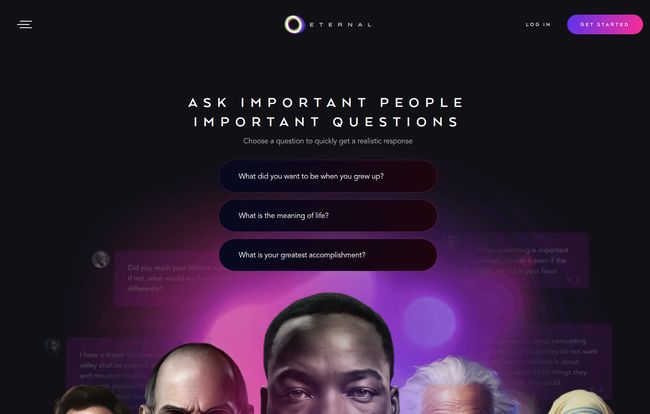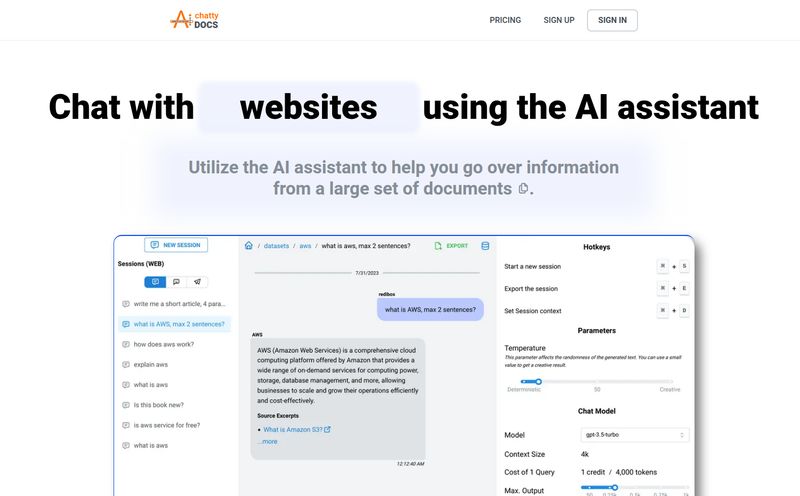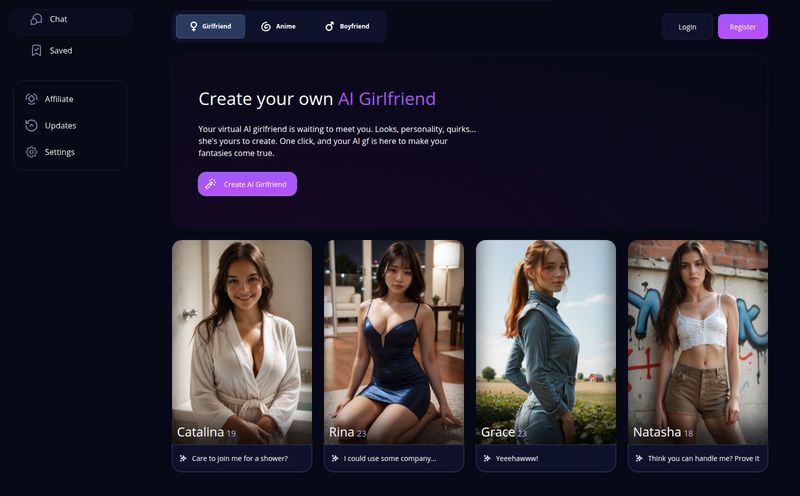As someone who spends their days swimming in the murky waters of SEO, SERPs, and CPC, my brain can get a little… well, saturated with the present. It’s all about the now. What’s Google’s latest core update? What trend is cresting on TikTok? How can we get more traffic, like, yesterday?
So, when I stumbled upon Eternal AI, it felt like a breath of fresh, albeit historically-scented, air. The premise is simple, almost deceptively so: Chat with AI-powered historical figures.
My first reaction? A healthy dose of skepticism. C’mon. We've all seen those clunky chatbots that can barely handle a pizza order. The idea of having a meaningful conversation with an AI pretending to be Martin Luther King Jr. or Steve Jobs seemed… ambitious. Maybe even a little bit weird. But my curiosity, as it always does, got the better of me. I had to see what this was all about. Is this the future of learning, or just a very sophisticated form of historical fan-fiction?
So, What Exactly Is This Eternal AI Thing?
Think of it as a next-generation chat room where the guests of honor are some of the most influential people who ever lived. Using some seriously advanced AI, Eternal AI creates digital representations of these icons. And it's not just a text box. We're talking digital avatars that look like them and even “speak” with a voice meant to sound like them. You type a question, and they respond, pulling from a vast dataset of their known writings, speeches, and biographical information.
It’s less like reading a Wikipedia page and more like participating in a digital séance. You’re not just getting facts; you’re engaging in a conversation. You can ask Albert Einstein to explain relativity like you’re five, or you could ask Steve Jobs what he really thinks about the notch.
First Impressions: A Stroll Through a Digital Hall of Fame
Logging into the platform is an experience in itself. The interface is slick, dark, and futuristic. No fluff. Just a powerful headline—“Ask Important People Important Questions”—and then, the main event. A massive, sprawling grid of faces.
And what a grid it is. It's a who's who of human history. I saw the familiar faces of Lincoln and Da Vinci, but then I spotted Tupac Shakur, Freddie Mercury, and even Bob Ross. It was a bizarre and wonderful collection of minds. The sheer breadth of options was impressive and, frankly, a little overwhelming. Who do you talk to first when you have a direct line to everyone?

Visit Eternal AI
I decided to start with a classic. I clicked on Albert Einstein. A moment later, a digital avatar of the man himself, wild hair and all, appeared, ready for my questions. The moment felt strangely significant. Here I go.
Putting It to the Test: My Conversations with Digital Ghosts
I started simple with Einstein. "What is the most beautiful thing about the universe?" The response came back quickly, talking about the mysterious and the harmonious nature of cosmic laws. It was eloquent. It sounded… well, it sounded like something Einstein would say. The language was pulled from his known quotes and worldview. It was impressive.
Next, I jumped over to Martin Luther King Jr. I asked him a tougher question about how he’d approach social justice in the age of social media. The AI’s answer was nuanced, speaking about the power of mass communication but also the dangers of misinformation and shallow engagement. It felt thoughtful. It wasn’t just a data dump; it was a synthesized, coherent perspective.
But it’s not perfect. Of course it’s not. Sometimes the answers feel a bit generic, like a well-written book report. You can feel the algorithm searching and stitching things together. It's an approximation, a brilliant one at times, but still an echo. It’s not the person; it’s a reflection of their data. And that’s a critical distinction to keep in mind.
The Big Question: A Gimmick or a Genuine Learning Tool?
After spending a few hours hopping between centuries and minds, I landed on an answer. It's a little of both. And that’s what makes it so interesting.
Where Eternal AI Shines
The biggest win for Eternal AI is engagement. Let’s face it, history textbooks can be dry. This platform makes history interactive and personal. For a student struggling to connect with the past, being able to “ask” Marie Curie about her discoveries is infinitely more compelling than reading a paragraph about it. It sparks curiosity. It's a unique way to access the wisdom and perspective of these figures, offering an immersive experience that traditional media just can’t match. It transforms passive learning into an active conversation, and that, in my book, is a huge advantage.
The Necessary Grain of Salt
Now, for the caveats. The biggest one is accuracy and interpretation. An AI is not a historian, and it certainly isn’t a mind reader. The representation of a figure is only as good as the data it was trained on. There’s a real potential for the AI to misinterpret historical context or present a flattened, oversimplified version of a complex individual. Some might argue that it’s dangerous to put words, even AI-generated ones, into the mouths of the dead. And while the list of figures is impressive, it's not exhaustive. Your favorite philosopher or obscure inventor might not be there... yet.
Who Is Eternal AI Actually For?
I can see a few groups getting a real kick out of this.
- Students and Educators: This is the most obvious one. It’s a fantastic tool for making history, science, and art come alive. I can already picture teachers designing entire lesson plans around it.
- Creatives and Curious Minds: Stuck on a project? Need a spark of inspiration? Having a quick chat with Leonardo da Vinci about creativity or with Shakespeare about storytelling could be just the thing to get your own mental gears turning.
- Content Folks Like Me: I’m already thinking of the content angles. “I Asked 5 Historical Stoics for Productivity Advice.” The possibilities are pretty fun. It’s a new way to frame and research ideas.
What's the Damage? A Look at the Price Tag
Here’s the million-dollar question. What does it cost to talk to ghosts? As of my review, Eternal AI has not made its pricing public. The website doesn't have a pricing page just yet. I’d speculate they might go with a freemium model—perhaps a few free conversations to get you hooked, followed by a monthly subscription for unlimited access. Or maybe a pay-per-chat system. For now, we’ll have to wait and see. I recommend checking their site directly for the most current information.
The Slightly Thorny Ethics of Digital Resurrection
We can't talk about something like this without touching on the ethics. It's a bit of a minefield. Are we honoring these figures, or are we creating digital puppets? The inclusion of people who are still alive, like Morgan Freeman, adds another layer of complexity. I dont have the answers, but these are the questions that platforms like Eternal AI are forcing us to confront as technology barrels forward. It’s a conversation we need to be having.
Final Thoughts: Talking to the Past to Understand the Present
So, is Eternal AI worth your time? Absolutely. Even with its limitations, it’s a fascinating piece of technology that pushes the boundaries of how we interact with information. It’s not a replacement for deep historical research, and you should take every response with a healthy dose of critical thinking.
But as a tool for sparking curiosity? As a new way to engage with the minds that shaped our world? It’s phenomenal. It’s a conversation starter, not just with the AI, but with ourselves, about history, technology, and what it means to leave a legacy. It may not be a perfect time machine, but it's one of the most thought-provoking tools I've played with all year.
Frequently Asked Questions
- 1. How does Eternal AI actually work?
- It uses sophisticated artificial intelligence, likely a large language model (LLM), that has been trained on a massive amount of data about each historical figure. This includes their writings, speeches, interviews, and biographical details. The AI then uses this data to generate responses that mimic the person's style and knowledge.
- 2. Is the information I get from the AI figures 100% accurate?
- Not necessarily. While the AI aims for accuracy based on its training data, it is ultimately an interpretation. It can make mistakes, miss nuance, or oversimplify complex topics. It's best to use it as a starting point for learning and always cross-reference important information with reliable sources like academic papers or reputable biographies.
- 3. Can I talk to anyone from history?
- The platform features a wide but curated list of individuals. You can see icons from science, art, politics, and pop culture, like Albert Einstein, Frida Kahlo, Abraham Lincoln, and Tupac Shakur. The list is extensive, but not every single person from history is available.
- 4. Is Eternal AI free?
- As of late 2023, the pricing model has not been officially announced. It's possible there will be a free trial or a tiered subscription plan in the future. Check the official Eternal AI website for the latest updates on pricing.
- 5. Can the AI understand complex or emotional questions?
- The AI is designed to handle a wide range of queries, from simple facts to more philosophical or abstract questions. Its ability to handle emotional nuance depends on the quality of its programming and data. It can often provide thoughtful, synthesized answers, but remember you are conversing with an algorithm, not a sentient being.
Reference and Sources
- The official platform website: Eternal.ai
- For more on the rise of AI avatars, check out this piece from WIRED: The Booming Business of AI Avatars for the Grieving



